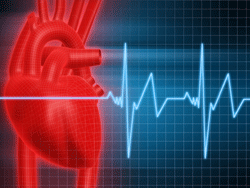What causes irregular heart beat? – Learn about heart disease.
 Here’s another question I asked Dr. Cynthia Shelby-Lane and her answer about causes irregular heart beat.
Here’s another question I asked Dr. Cynthia Shelby-Lane and her answer about causes irregular heart beat.
Lisa Nelson: What do you recommend for individuals experiencing heart palpitations and what may be triggering the problem?
Dr. Shelby-Lane: Arrhythmias are any deviations in the normal rhythm of the heart (heartbeat). They usually occur as a result of interference with the electrical pathways that produce the heart’s rhythmic muscular contractions. The Parasympathetic Nervous System is responsible for slowing down the heartbeat rate. The Beta-1 Adrenergic Receptors of the Beta-Adrenergic Nervous System are responsible for speeding up the heartbeat rate.
If you experience the following symptoms, you may need to be evaluated for toxicity and consider a stress test, echocardiogram, holter monitor or a tilt table test for further evaluation and diagnosis. A neurologic evaluation may also be indicated.
Fluttering or pounding in the heart
Hemodynamic disturbances are potentially life-threatening such as bradycardia and tachycardia
Dizziness
Syncope (fainting)
Unusual awareness of the heart
Anxiety
Abnormal ECG (provides a “one-shot” picture of the electrical activity of the heart)
Holter 24-hour monitoring results (Holter monitors look at the heart for a longer period of time and are necessary to detect intermittent rhythm problems.
Possible Causes Irregular Heart Beat, Contributing or Associated Factors
1. Coronary artery disease
2. Hypertension
3. Adverse drug reactions
4. Endocrine imbalances, especially thyroid or adrenal disorders
5. Myocardial tissue disease (valvular, atrial and ventricular abnormalities)
6. Sequela of rheumatic fever
7. Metabolic disorders
8. Nutritional deficiencies, especially magnesium
9. Caffeine
10. Environmental toxins or food allergies
11. Damaged conductive tissue (neurocardiogenic syncope)
12. toxicities
13. anxiety and stress disorders, etc.
Follow up diagnostic testing is recommended to determine if the above conditions are causing the problem.
Heart disturbances can occur as a symptom of magnesium deficiency: Measuring your red blood cell magnesium can give you a good idea of your actual magnesium level.
All the best,
Lisa Nelson RD
Heart Healthy Tips



